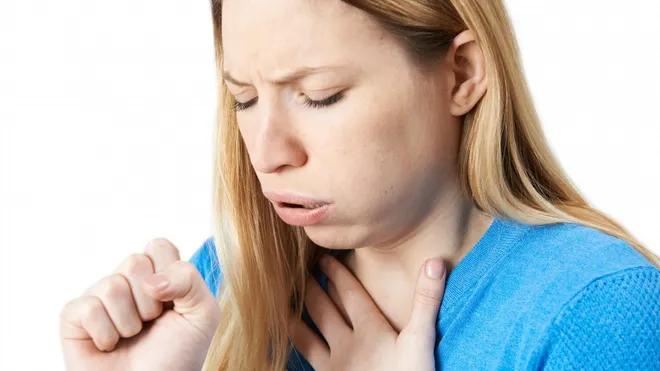Bordetella pertussis or whooping cough can cause one sick person to infect up to 15 people, making it highly contagious. Whooping cough is a bacterial infection of the lungs which causes a person to gasp for breath, causing the whooping sound.
Read on to learn more about whooping cough, how it’s transmitted and how it can be prevented.
📝 Is whooping cough contagious?
Yes. Whooping cough spreads from person to person as an airborne infection. During coughing spells, sneezing or even talking, micro-droplets from the nasal cavity and throat are released into the air, where they can then be inhaled by others. Close contact between an infected person and an uninfected person can lead to infection.
When a person is infected, the bacterial cells enter the upper respiratory tract, attach to ciliated cells and start to produce toxins. The toxins damage airways, causing the airways to swell and increase mucus production. This results in coughing fits of increased intensity and other symptoms.
Many babies, young children and older children who get whooping cough are infected by their siblings or other family members who may not know they have it.
📊 Symptoms of whooping cough
Whooping cough symptoms typically progress in three phases:
- The incubation stage resembles cold-like symptoms such as a runny nose, sneezing, mild fever and an occasional cough lasting around two weeks
- The paroxysmal stage is more severe with fits of rapid coughing lasting over a week, vomiting during and after coughing fits, exhaustion during coughing fits and a low grade fever. Young babies may experience apnea (stop breathing) or cyanosis (a bluish skin colour) during coughing fits. In adolescents and adults, the symptoms are generally worse at night
- The third stage of whooping cough is the convalescent stage, which may last for several weeks. There is a gradual improvement in coughing fits and severity. The cough becomes milder and less frequent. Coughing fits may stop for a while, but they can return when you get another respiratory infection
🩺 Diagnosis
Diagnosis is based on your medical history and a physical examination. Your healthcare provider may also request blood tests or a throat swab to confirm the presence of the bacterial infection, to distinguish it from other health conditions.
❗People most at risk of severe complications
People at greatest risk from whooping cough infection include:
- Infants under one year old. Serious complications can be life-threatening for infants younger than 6 months old
- Pregnant women, especially those in the third trimester
- People that have chronic respiratory system illnesses and other health conditions
📈 Complications of whooping cough
- Infants may have a pause in their breathing (apnea), dehydration, pneumonia or seizures
- Older children and adults they may develop sore ribs, a hernia, middle ear infections or urinary incontinence
- Brain damage from lack of oxygen is rare but is possible. Most at risk are sick babies younger than 6 months
📝 How can I protect myself from whooping cough?
Vaccination is the most effective way to protect yourself. Immunity decreases over time, therefore boosters are required. The whooping cough vaccine or pertussis vaccine is recommended by the NHS for:
- Babies at 8, 12 and 16 weeks of age, who receive the 6-in-1 vaccine. Vaccination also protects against diphtheria, tetanus, polio, Hib (Haemophilus influenzae type b) and hepatitis B. Vaccinating your child at the right time gives important protection during this vulnerable time
- Children aged 3 years 4 months of age, who receive the 4-in-1 pre-school booster
- Pregnant women should receive the vaccine at around 20 weeks into their pregnancy to help protect the baby for the first few weeks of their life. Antibodies are transferred through the placenta, providing short term protection until the baby can receive their own vaccine
It’s important to remember the vaccine isn’t just to protect yourself but to protect individuals around you that might be at high risk for getting sick.
💊 Treatment
Whooping cough is treated with appropriate antibiotics to help prevent the bacteria spreading to others and to reduce symptoms.
Other measures that can help include:
- Drinking lots of fluids
- Plenty of rest to conserve energy between coughing spells
- Small frequent meals to avoid vomiting
- Avoiding taking cold and cough medicines, unless prescribed by a healthcare professional
- Keeping away from things that may trigger a cough
Do I need to isolate with a whooping cough?
Yes. If someone in your household has whooping cough, keep them isolated from others, especially from infants, people with health conditions or individuals who have not been vaccinated.
📝 When should I see my healthcare provider?
If your child is struggling to breathe, has a high pitched whoop or is turning blue around the lips, it’s essential to get medical help immediately. Persistent and severe coughing also requires medical attention. Trust your instincts. Seek medical attention if you feel something is wrong or your illness continues to worsen.
Sources
- Whooping cough – NHS
- Whooping cough – Symptoms & causes – Mayo Clinic
- Whooping Cough (Pertussis): Causes, Symptoms & Prevention
- Whooping cough – Health topics A to Z – CKS – NICE
- Pertussis (Whooping Cough) | Whooping Cough – CDC
Medical Disclaimer
NowPatient has taken all reasonable steps to ensure that all material is factually accurate, complete, and current. However, the knowledge and experience of a qualified healthcare professional should always be sought after instead of using the information on this page. Before taking any drug, you should always speak to your doctor or another qualified healthcare provider.
The information provided here about medications is subject to change and is not meant to include all uses, precautions, warnings, directions, drug interactions, allergic reactions, or negative effects. The absence of warnings or other information for a particular medication does not imply that the medication or medication combination is appropriate for all patients or for all possible purposes.








